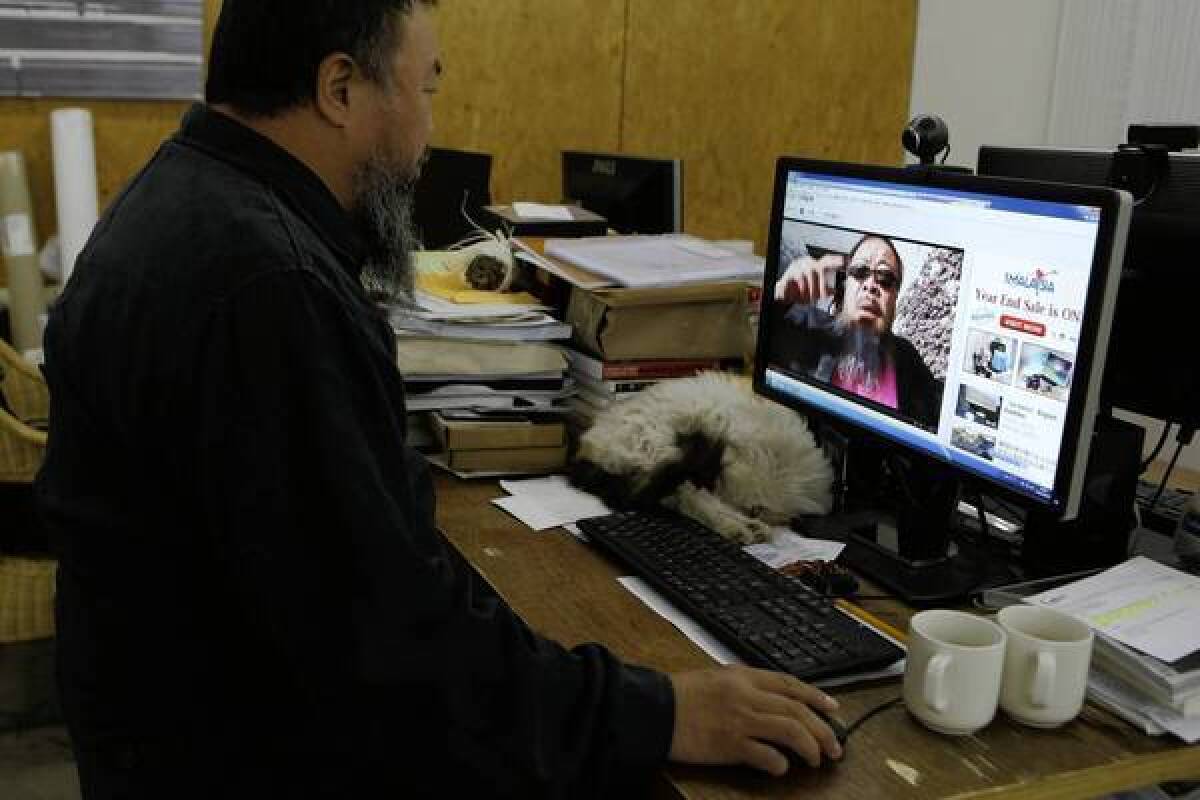China dissident Ai Weiwei basks in his relative liberty

- Share via
BEIJING — Ai Weiwei is out of the box.
China’s most famous provocateur is once again tweeting and tweaking, taunting and generally making a nuisance of himself as a critic of the Chinese Communist Party.
After an 81-day stay in detention and a year of lying low, Ai is suddenly seemingly everywhere at once. Last month, his first major museum show in the United States opened at the Smithsonian Institution’s Hirshhorn Museum in Washington. He is the star of a documentary, “Ai Weiwei: Never Sorry,” and guest-edited (via Skype, since he can’t leave China) an edition of Britain’s prestigious New Statesman magazine.
He held forth on CNN about the U.S. presidential election, contrasting American democracy with China’s stage-managed leadership transition.
The 55-year-old Ai probably got the most attention recently for his video cover of the South Korean hip hop hit “Gangnam Style,” in which he shakes his ample belly and twirls a pair of handcuffs as though daring the Chinese government to arrest him again. The video, recorded at his Beijing studio, has gotten more than 1 million hits on YouTube.
Ai’s legal troubles are not completely behind him. Although he is no longer facing criminal charges for tax evasion, the government is suing him for $2.4 million in back taxes and penalties.
Still, his circumstances are better than those of other prominent Chinese dissidents: The blind lawyer Chen Guangcheng is in exile in the United States and Nobel peace laureate Liu Xiaobo is serving an 11-year prison sentence for subversion.
“My situation is not bad at all. It could be worse,” Ai said during a recent interview in the gray brick-walled compound where he lives and works northeast of Beijing. “As a person, I was born to give out my opinions. By giving out my opinions, I realize who I am. As long as I can communicate, I’m not so lonely. If I cannot travel, or do art, or have company, if they take away all my belongings, it doesn’t matter at all.”
Although he has gained back the 30 pounds he lost in detention, Ai looked fit and relaxed. It was a cool, sunny autumn morning and he sat outside in a courtyard with pumpkins and pots of chrysanthemums, a few of his dozens of cats basking in the sun. A film crew was setting up a camera at one corner. A rock musician pal and his daughter played nearby.
Ai’s compound is a busy place, having become something of an open house for musicians, dissidents, foreign journalists and assorted visitors whom he gives T-shirts silk-screened with a silhouette of his face.
Ai once bristled when called a dissident, insisting he was merely an artist. Nowadays, he has fully embraced his role, and shrugs off critics who say he’s drifted away from art toward activism.
“People are always wondering if I am an artist or political activist or politician,” Ai retorted with slight irritation, when asked what he was doing in the way of art. “Maybe I’ll just clearly tell you: Whatever I do is not art. Let’s say it is just objects or materials, movies or writing, but not art, OK?”
Recently, he has been mostly producing videos and documentaries and writing.
This month, he released a short video called “How to Scientifically Remove a Shiny Screw with Chinese Characteristics from a Moving Vehicle in Eighteen Turns” that ridiculed the recently completed 18th Communist Party congress and some of its hollow slogans like “scientific development” and “socialism with Chinese characteristics.”
Ai’s commentary appears mostly in English. His popular blog on China’s online social network Sina Weibo was closed down by censors in 2009. He opines prolifically for the foreign press; but in Chinese, he is mostly silent, which may be part of his accommodation with authorities.
“Ai Weiwei knows just how far to push things without getting into more trouble,” said Liu Xiaoyuan, one of his lawyers.
Ai’s liberty is qualified at best. He goes out of the compound every day for at least a walk in the park or to see his 3-year-old son, born to a woman who is not his wife.
But he cannot leave China — the authorities have not returned his passport — so his exhibits have to be assembled by others. That is cumbersome, because Ai’s pieces are large. The show at the Hirshhorn Museum includes a sculpture of steel beams salvaged from the 2008 Sichuan province earthquake, the theme for much of Ai’s recent works.
“My work is done by people I’ve been working with the past few decades. They understand my aesthetic,” Ai said. “We show our products. Just like any farmer selling vegetables on Saturday morning. It’s all fresh. Take if you like; if you don’t, I’ll eat it.”
Ai shrugs off the other inconveniences of his life.
“As an artist, I have been dealing with many awkward circumstances,” he said.
What he seems to want most is to show Chinese authorities he is a man who cannot be broken. He recalls his experiences as a child during the Cultural Revolution, when his father, the noted poet Ai Qing, was purged and exiled to remote Xinjiang in western China.
“My father had to clean toilets when the temperature was 100 in summer and below zero in winter. I mean — come on — we passed that test long ago,” Ai said.
“For me, it is OK as long as I can breathe, as long as my heart is pumping, as long as I can express myself.”
More to Read
Sign up for Essential California
The most important California stories and recommendations in your inbox every morning.
You may occasionally receive promotional content from the Los Angeles Times.










